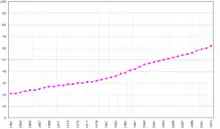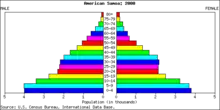Demographics of American Samoa include population density, ethnicity, education level, health of the populace, economic status, religious affiliations and other aspects. American Samoa is an unincorporated territory of the United States located in the South Pacific Ocean.

Vital statistics
Births and deaths[1]
| Year | Population | Live births | Deaths | Natural increase | Crude birth rate | Crude death rate | Rate of natural increase |
|---|---|---|---|---|---|---|---|
| 2001 | 59,400 | 1,655 | 239 | 1,416 | 27.9 | 4.0 | 23.9 |
| 2002 | 60,800 | 1,629 | 295 | 1,334 | 26.8 | 4.9 | 21.9 |
| 2003 | 62,600 | 1,608 | 257 | 1,351 | 25.7 | 4.1 | 21.6 |
| 2004 | 64,100 | 1,713 | 289 | 1,424 | 26.7 | 4.5 | 22.2 |
| 2005 | 65,500 | 1,720 | 279 | 1,441 | 26.3 | 4.3 | 22.0 |
| 2006 | 66,900 | 1,442 | 267 | 1,175 | 21.6 | 4.0 | 17.6 |
| 2007 | 68,200 | 1,293 | 251 | 1,042 | 19.0 | 3.7 | 15.3 |
| 2008 | 69,200 | 1,338 | 240 | 1,098 | 19.3 | 3.5 | 15.8 |
| 2009 | 70,100 | 1,375 | 324 | 1,051 | 19.6 | 4.6 | 15.0 |
| 2010 | 67,380 | 1,279 | 247 | 1,032 | 19.0 | 3.7 | 15.3 |
| 2011 | 64,292 | 1,287 | 283 | 1,004 | 20.0 | 4.4 | 15.6 |
| 2012 | 63,596 | 1,175 | 282 | 893 | 18.5 | 4.4 | 14.1 |
| 2013 | 62,610 | 1,161 | 270 | 891 | 18.5 | 4.3 | 14.2 |
| 2014 | 61,811 | 1,084 | 259 | 825 | 17.5 | 4.2 | 13.3 |
| 2015 | 60,863 | 1,096 | 314 | 782 | 18.0 | 5.2 | 12.8 |
| 2016 | 60,200 | 1,013 | 280 | 733 | 16.8 | 4.7 | 12.1 |
| 2017 | 60,300 | 1,001 | 310 | 691 | 16.6 | 5.1 | 11.5 |
| 2018 | 59,600 | 921 | 298 | 623 | 15.5 | 5.0 | 10.5 |
| 2019 | 58,500 | 840 | 278 | 562 | 14.4 | 4.8 | 9.6 |
Structure of the population
| Age Group | Male | Female | Total | % |
|---|---|---|---|---|
| Total | 28 164 | 27 355 | 55 519 | 100 |
| 0–4 | 3 417 | 3 194 | 6 611 | 11.91 |
| 5–9 | 3 470 | 3 065 | 6 535 | 11.77 |
| 10–14 | 3 214 | 3 065 | 6 279 | 11.31 |
| 15–19 | 3 218 | 3 078 | 6 296 | 11.34 |
| 20–24 | 1 944 | 1 947 | 3 891 | 7.01 |
| 25–29 | 1 670 | 1 654 | 3 324 | 5.99 |
| 30–34 | 1 726 | 1 784 | 3 510 | 6.32 |
| 35–39 | 1 845 | 1 764 | 3 609 | 6.50 |
| 40–44 | 1 793 | 1 807 | 3 600 | 6.48 |
| 45–49 | 1 673 | 1 716 | 3 389 | 6.10 |
| 50–54 | 1 335 | 1 344 | 2 679 | 4.83 |
| 55–59 | 1 011 | 1 038 | 2 049 | 3.69 |
| 60–64 | 755 | 725 | 1 480 | 2.67 |
| 65-69 | 500 | 460 | 960 | 1.73 |
| 70-74 | 321 | 333 | 654 | 1.18 |
| 75-79 | 155 | 182 | 337 | 0.61 |
| 80-84 | 76 | 130 | 206 | 0.37 |
| 85+ | 41 | 69 | 110 | 0.20 |
| Age group | Male | Female | Total | Percent |
| 0–14 | 10 101 | 9 324 | 19 425 | 34.99 |
| 15–64 | 16 970 | 16 857 | 33 827 | 60.93 |
| 65+ | 1 093 | 1 174 | 2 267 | 4.08 |
Population statistics
| Year | Pop. | ±% |
|---|---|---|
| 1900 | 5,679 | — |
| 1912 | 7,251 | +27.7% |
| 1920 | 8,056 | +11.1% |
| 1930 | 10,055 | +24.8% |
| 1940 | 12,908 | +28.4% |
| 1950 | 18,937 | +46.7% |
| 1960 | 20,051 | +5.9% |
| 1970 | 27,159 | +35.4% |
| 1980 | 32,297 | +18.9% |
| 1990 | 46,773 | +44.8% |
| 2000 | 57,291 | +22.5% |
| 2010 | 55,519 | −3.1% |
| 2020 | 49,710 | −10.5% |
The statistics from 1900 to 1950 and every decennial census are from the U.S. Census Bureau. There was no census taken in 1910, but a special census taken in 1912. Beginning with the 1930 Census, Swain Island is included in the population count for American Samoa. The remaining statistics are from the World Factbook, unless otherwise indicated.[3]
Population
Age structure
- 0–14 years: 27.76% (male 7,063/female 6,662)
- 15–24 years: 18.16% (male 4,521/female 4,458)
- 25–54 years: 37.49% (male 9,164/female 9,370)
- 55–64 years: 9.69% (male 2,341/female 2,447)
- 65 years and over: 6.9% (male 1,580/female 1,831) (2020 est.)
Median age
- total: 27.2 years
- male: 26.7 years
- female: 27.7 years (2020 est.)
Population growth rate
- −2.1% (2021 est.)
Birth rate
- 17.19 births/1,000 population (2021 est.)
Death rate
- 6 deaths/1,000 population (2021 est.)
Net migration rate
- −32.18 migrant(s)/1,000 population (2021 est.)
Urbanization
- Urban population: 87.2% of total population (2020)
- Rate of urbanization: 0.07% annual rate of change (2015-20 est.)
Sex ratio
- At birth: 1.06 male(s)/female
- 0–14 years: 1.06 male(s)/female
- 15–24 years: 1.01 male(s)/female
- 25–54 years: 0.98 male(s)/female
- 55–64 years: 0.96 male(s)/female
- 65 years and over: 0.86 male(s)/female
- Total population: 1 male(s)/female (2020 est.)

Infant mortality rate
- Total: 10.25 deaths/1,000 live births
- Male: 12.39 deaths/1,000 live births
- Female: 8 deaths/1,000 live births (2021 est.)
Life expectancy at birth
- Total population: 75.06 years
- Male: 72.55 years
- Female: 77.72 years (2021 est.)
Total fertility rate
- 2.28 children born/woman (2021 est.)
Nationality
- Noun: American Samoan(s) (US Nationals)
- Adjective: American Samoan
Ethnic groups
- Pacific Islander 92.6% (includes Samoan 88.9%, Tongan 2.9%, other 0.8%)
- Asian 3.6% (includes Filipino 2.2%, other 1.4%)
- Mixed 2.7%
- Other 1.2% (2010 est.)
Religions
- Christian 98.3%
- Other 1%
- Unaffiliated 0.7% (2010 est.)
Major Christian denominations on the island include the Congregational Christian Church in American Samoa, the Catholic Church, the Church of Jesus Christ of Latter-day Saints and the Methodist Church of Samoa. Collectively, these churches account for the vast majority of the population. [9]
J. Gordon Melton in his book claims that the Methodists, Congregationalists with the London Missionary Society, and Catholics led the first Christian missions to the islands. Other denominations arrived later, beginning in 1895 with the Seventh-day Adventists, various Pentecostals (including the Assemblies of God), Church of the Nazarene, Jehovah's Witnesses, and the Church of Jesus Christ of Latter-day Saints.
The World Factbook 2010 estimate shows the religious affiliations of American Samoa as 98.3% Christian, other 1%, unaffiliated 0.7%.[3] World Christian Database 2010 estimate shows the religious affiliations of American Samoa as 98.3% Christian, 0.7% agnostic, 0.4% Chinese Universalist, 0.3% Buddhist, and 0.3% Baháʼí.[10]
According to Pew Research Center, 98.3% of the total population is Christian. Among Christians, 59.5% are Protestant, 19.7% are Catholic and 19.2% are other Christians. A major Protestant church on the island, gathering a substantial part of the local Protestant population, is the Congregational Christian Church in American Samoa, a Reformed denomination in the Congregationalist tradition. As of August 2017, The Church of Jesus Christ of Latter-day Saints website claims membership of 16,180 or one-quarter of the whole population, with 41 congregations, and 4 family history centers in American Samoa.[11] The Jehovah's Witnesses claim 210 "ministers of the word" and 3 congregations.[12]
Languages
Native languages include:
English proficiency is very high.
References
- ↑ "Statistical Yearbook | Department of Commerce". October 15, 2018.
- ↑ "UNSD — Demographic and Social Statistics". unstats.un.org. Retrieved May 10, 2023.
- 1 2 "American Samoa". The World Factbook (2024 ed.). Central Intelligence Agency. October 6, 2021. (Archived 2021 edition)
- ↑ "American Samoa Population (live) - Worldometers". www.worldometers.info.
- ↑ Mendoza, Moises (October 11, 2014). "How a weird law gives one group American nationality but not citizenship". Public Radio International (PRI). Retrieved August 24, 2018.
Those nationals — born on the 55,000-person US island territory in the South Pacific — receive US passports, can serve in the military and work and live on the mainland United States.
- ↑ "U.S. nationals born in American Samoa sue for citizenship". NBC News. Associated Press. March 28, 2018. Retrieved 2018-10-01.
- ↑ "Census 2010 News | U.S. Census Bureau Releases 2010 Census Population Counts for American Samoa". 2010 United States Census. census.gov. Archived from the original on July 23, 2012. Retrieved October 1, 2018.
- 1 2 2010 American Samoa Demographic Profile Data, U.S. Census Bureau.
- ↑ Macpherson, Cluny; Macpherson, La'avasa (2011). "Churches and the Economy of Sāmoa". The Contemporary Pacific. 23 (2): 304–337. doi:10.1353/cp.2011.0042. hdl:10125/23847. JSTOR 23725519. S2CID 154742271 – via JSTOR.
- ↑ "American Samoa: Adherents Profile at the Association of Religion Data Archives, World Christian Database". Thearda.com. Retrieved February 26, 2014.
- ↑ "LDS Newsroom". Mormonnewsroom.org. Retrieved August 11, 2017.
- ↑ "American Samoa: How Many Jehovah's Witnesses Are There?". JW.ORG. Retrieved August 13, 2017.